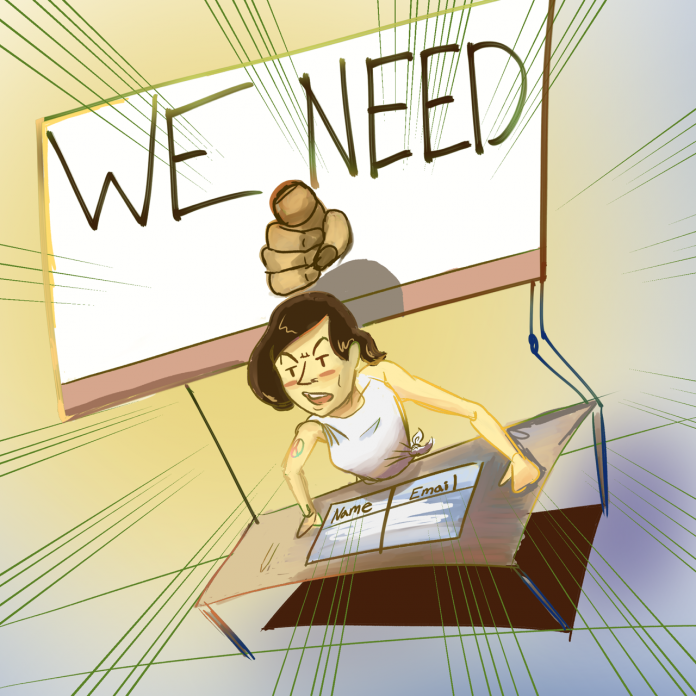As we all know, the College of William and Mary has a diverse array of student organizations. Walk through the Sadler Center any odd day, and you’ll be barraged by an assortment of tables, their organizers periodically yelling at unsuspecting freshmen. Thanks to tables in Sadler, on the Terrace and occasionally in Campus Center, I have become adept at avoiding eye contact and pretending I can’t hear people a couple feet away.
All jokes about overly enthusiastic “tablers” aside, I truly appreciate the College’s dedication to providing spaces for student activism and service. It’s important for students to be familiar with the diversity of viewpoints and activities represented on our campus and to have opportunities to advocate for their own. However, in order to more fully accomplish these goals, the College needs to make some changes.
Right now, everything revolves around student organizations — whether that’s tabling, hosting events or putting advertisements up around campus. Don’t get me wrong, I’m a big fan of student organizations, and I’m heavily involved in a number of them. But the exclusive focus on these groups crowds out some other really valuable parts of student life. What if a student wants to publicize his art around campus but can’t find an organization that’s interested in sponsoring him to put up flyers or table? What if someone is passionate about a service opportunity, but she can’t gather enough people to form a group that can fundraise? What if someone connects with a well-known speaker but none of the groups on campus want to get involved in sponsoring a lecture? I think it’s vital that individual students have space to fully explore their interests and take initiative to get things — whether it’s sales, service or speaker events — done on their own, without having to be in a student organization.
One summer in high school, I interned at a rehabilitation center for Syrian refugees where widowed women were taught skills like soap making as a form of sustainable income. When I got back for my senior year, I was excited about the talent and resilience of these women and wanted to continue my involvement in the center’s important work. I flew hundreds of soap bars back home with me and was able to sell them at school and community functions. When I got to college, however, an initiative like this got a lot more tricky.
Before coming to the College, I emailed the Office of Student Leadership and asked if sales like these would be possible. They told me to connect with a student group on campus. Over my freshman year, I tried to reach out to a number of organizations, but each posed a different challenge, whether it be dues, lack of response or them having too much already on their agenda. If the College simply booked tables to individual students or unofficial groups of students, entrepreneurs and altruists wouldn’t have so many problems to navigate.
More opportunities on a college campus is rarely a bad thing. Providing students with more freedom and flexibility will help them learn from new avenues of experience and even mistakes. In addition, skills students can foster through the array of activities in which they’d be able to engage — learning how to book rooms, organize events, sell items or ideas and simply communicate with others —will undoubtedly aid them in future personal and professional endeavors. The ability to find creative ways to accomplish novel tasks is more important than ever, especially in view of our changing economy and society. The College should be cultivating students who are innovative and entrepreneurial — and loosening up on regulating tables, posters and lecture rooms is one way to start.
Email Chloe Folmar at csfolmar@email.wm.edu.


[…] article was originally published in The Flat Hat, the official newspaper of the College of William & […]
[…] spaces, tables and even classrooms only for recognized student organizations is troubling. (My 2019 thoughts on this issue were published here.) As it stands now, all published speech and postings on campus must be filtered through the […]
[…] spaces, tables and even classrooms only for recognized student organizations is troubling. (My 2019 thoughts on this issue were published here.) As it stands now, all published speech and postings on campus must be filtered through the […]